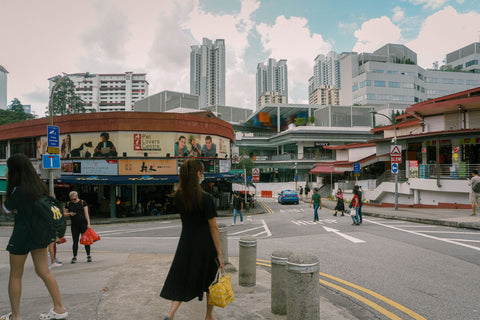
For most of us, the mention of Holland Village evokes memories both boisterous and gregarious. Our mouths would water at the thought of eating there.
As a central neighbourhood less than 10 minutes from Orchard Road, Holland Village may be an upscale and fairly tranquil neighbourhood by day. But it’s beloved nationwide—to start, its array of acclaimed eateries, ranging from eclectic bars and coffee shops to highly decorated restaurants, along with its famous hawker centre.
Once nicknamed ‘the second Orchard Road’, Holland Village has gradually descended from a popular hangout to an underpopulated neighbourhood, frequented only by the handful who live, work and study in the vicinity.
Wala Wala Café Bar—or Wala Wala, for short—is, by far, the most famous and longest-standing of Holland Village’s watering holes.
“Wala Wala is the spot where Jack and I scored our first gig as a duo. We eventually played to capacity crowds here and realised that we had been part of the origin story of a phenomenal local music venue,” says Rai Kannu, one-half of the iconic Singaporean music duo, Jack & Rai.
Over the years, Wala Wala has played a pivotal role in putting Singaporean musicians under the spotlight, helping to propel the music careers of bands like The Lost Box and Shirlyn + The UnXpected. This did not prevent the bar from closing its live music space.
“It was not sustainable to keep it running with high rentals, the lack of crowds and restrictions on outdoor seating,” Rai says. He commends its owner, Stanley Yeo, for “trying to stick it out”.
“Back then, with no end to the Covid live music restrictions in sight, something had to give.”
Previously a two-storey Holland Village icon with an additional outpost in Tiong Bahru, this bastion of local entertainment has been reduced to a single-storey pub. While it survived a rollercoaster ride of Covid-19 restrictions, Wala Wala’s odyssey best illustrates the predicament that Holland Village currently faces.
“After Covid, the entire Holland Village has been slow compared to [times] before Covid. Perhaps drivers are too lazy to walk as the current car park is ‘far away’. It’s worse when it rains,” remarks Stanley. He divulges that Wala Wala draws smaller crowds these days, attributing to the fact that Wala Wala no longer has live music.
And the fact that Holland Village’s car park is now much smaller.
The Awakening of Holland V
Today, my wife and I live in an apartment within walking distance from Holland Village.
We have been talking about moving into a larger house. Given our budget, that larger house would be far away from Holland Village—and, unfortunately, its amazing dining options. After Covid-19 restrictions were lifted, Holland Village remained somewhat sleepy and experienced relatively low footfall. Over recent years, rental hikes have become the norm. Old establishments like Denny’s, NYDC, and Swensen’s have closed their doors for good.
Its history, in part, is what’s keeping us here.
Originally comprising a cluster of homes, which were built for British Army personnel and their families in the mid-20th century, Holland Village derives its name from early resident and English architect Hugh Holland.
Featuring a decorative windmill inspired by its name, along with a cinema complex owned by Eng Wah, its central location and westernised image perennially attracted food and beverage businesses, like Jumbo Coffeehouse and Palm’s Wine Bar, to set up shop here.
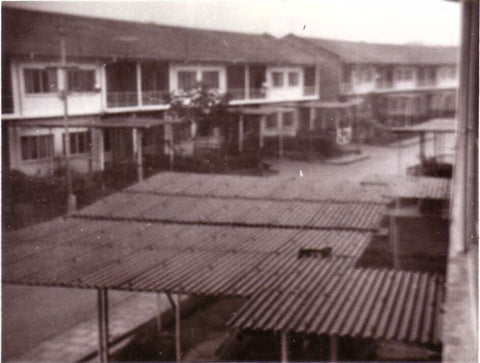
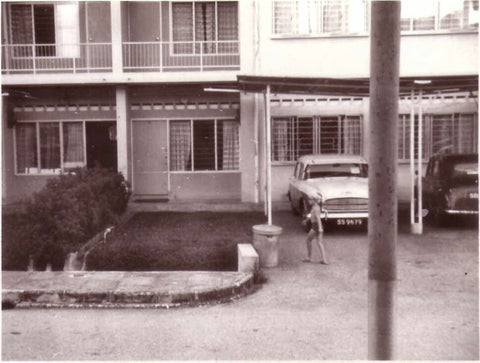
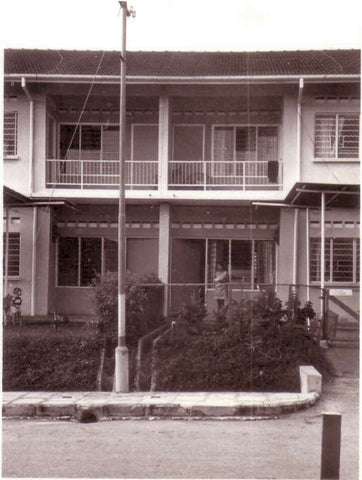
In the 1990s, my parents would buy me plastic Monster in My Pocket figurines from the corner shop after Saturday dinners in Holland Village Food Centre. My wife recalls happy childhood dinners at Fosters Steakhouse. After over 50 years in business, the latter restaurant closed its doors for good in 2022.
By 2011, Holland Village had its own MRT stop. Government agencies, like the Urban Redevelopment Authority and Singapore Tourism Board, now spend sizeable resources to develop and promote this lifestyle district.
Although its surviving food and retail tenants are far from mid (as the modern terminology goes) footfall is still low for a few reasons.
Besides the long-term effects of the almost-coup de grâce dealt by Covid-19 restrictions, other factors have caused the neighbourhood’s businesses to reap slender margins. Holland Village is no longer a prominent nightspot. Over time, nearby residents have appealed to authorities to reduce noise pollution in the area. Fewer liquor licenses have been issued since.
Holland V’s Whole Land
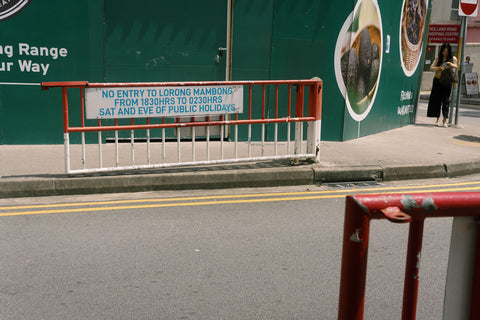
“Ever since the car park closed, we’ve seen fewer customers,” laments Jenny Ong, who works at the Friends drinks stall, which serves beer and non-alcoholic beverages in Holland Village Food Centre.
“Whether the new property beside the market will bring us more customers will depend on whether its parking lots are sufficient.” This, to Jenny, would be the key deciding factor whether their patronage will increase to “how it used to be.”
Madam Fu, who operates Liang Ji Wanton Noodle at the hawker centre, echoed that the closure of the carpark dealt a heavy blow to Holland Village eateries.
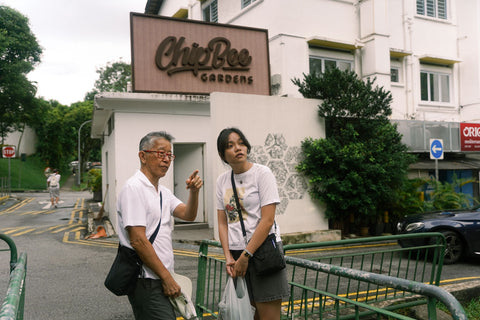
“Most stalls in the market have shuttered too, which is another factor that greatly affected our business.”
My interviews with these business owners were done before the launch of a new Holland Village property, which looks to change the game completely.
Comprising residential, retail and commercial units, along with up to 500 parking lots, One Holland Village aims to increase the population of Holland Village. It’s a significant part of a broader initiative to revitalise the district to attract a new wave of Singaporeans all across the island.
But here’s the big question. For the businesses who’ve stayed in the area all this time, will this translate to more patronage for them?
Changing the Skyline
One Holland Village is a mixed-use development designed by MKPL Architects, themed by the history of Holland Village.
Some of its residential units are linked to roof terraces by spiral staircases, just like Holland Village’s old shophouses. Murals and sculptures that permeate this open-concept mall reminisce the sights and sounds of old Holland Village. Its retail and commercial wing opened just this month, while its condominium and serviced suites are slated to open in the third quarter of 2024.
This contemporary mall is designed to integrate into, and compliment, the preexisting Holland Village. It has several entrances for cars and human traffic—its network of sheltered linkways and overhead bridges connect to the bus stop, the MRT station and the various arteries of Holland Village.
Housing pocket-friendly cafes, restaurants, fitness studios and boutiques, Holland Village catches the eye with its architectural make-up, along with art installations by prominent local artists like Jahan Loh and Rippleroot that form a visually captivating trail. It features metallic, larger-than-life renderings by Jahan of popular neighbourhood shop provisions, like canned foods and packet drinks, while Rippleroot artfully recreates slice-of-life scenes of its active surroundings.
Speaking of art and unique experiences, members of the public can sign up for hands-on workshops held at Artground. Meanwhile, fitness outlet Sphere has a sensory deprivation pool designed to aid mental and physical recovery.
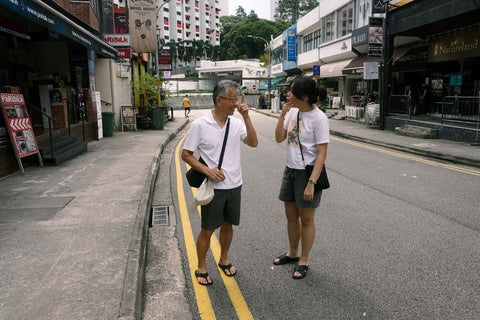
One Holland Village comprises numerous open spaces that invite the community to convene and connect—pets included.
The open-concept mall is made friendly for furkids—with special water fountains and lush recreational areas catered for them. Even in shops like Plain Meredith, a new concept by café chain Baker’s Brew, and accessories outlet Fur by Vetreska (opening in early 2024), pets are welcomed just as much as humans are.
The variation in clientele, in theory, is enough of an attraction for business owners to set up shop in One Holland Village.
Two years ago, husband-and-wife duo William and Pie Brodie founded Caffeine Xpress, setting up shop beside Thambi Magazine Store in Holland Village Shopping Centre. Now, they operate out of One Holland Village.
“When we were brewing beside Thambi Magazine Store and the MRT exit, we found ourselves serving many commuters,” Pie says, adding that their new location has “better visibility”, being right in front of the market.
The couple had their sights on One Holland Village once they’d heard of it. While on the daily grind, it definitely helps that the building is pet-friendly. “I love seeing the different cute dogs walk by while we brew coffee!”
A Village Revival?
Long-time tenants like Ms Lee, who works at the nearby coffee shop’s drinks stall, Holla@Holland Village, shared that business has increased since the opening of Holland Village.
Phillip Ang, who owns the iconic Phillip Antique Investment located at the front of Holland Village Market and Food Centre, agrees. His business, he tells me, has increased by around 30 per cent within One Holland Village’s opening week. More people have been visiting his shop, “especially foreigners.”
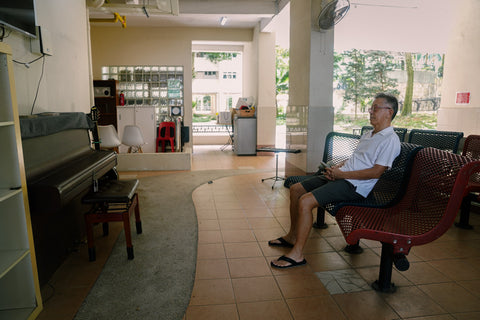
“I am hopeful that the serviced suites opening next year will channel even more traffic to my shop,” Phillip continues.
Wala Wala’s Stanley is starting to reclaim the optimism that first powered the launch of his bar.
“With One Holland Village’s new car park and almost double the number of car park lots, all the Holland Village tenants are hoping the traffic will return to Holland Village,” Stanley offers.
“Plus, with the addition of more F&B and retail shops, we do hope the crowd will spill over onto Lorong Mambong and Lorong Liput.”
He estimates that, with a gradual flock of new residents, it may only kick in “in a year’s time”. Just like it was during the pandemic, he’s willing to wait it out for brighter days ahead.
James Peter, manager of Baden—one of the few bars in the district with a license to serve alcohol till late—errs closer to the side of caution. “We’ve experienced a slight increase in sales. However, not many people are aware yet about the many new parking lots available,” he says.
“Will it be good for us? I think it’ll be a win for us because One Holland Village will definitely channel human traffic to us. But, only in the weeks and months to come, we will know for certain.”
Overall, tenants who were hit hard by recent retail woes are starting to see a new trajectory forward, noting an uptick since the opening of One Holland Village. What was once a slow-paced neighbourhood is now headed towards being a distinct and futuristic township.
So, yes, I’d love a larger house in the heartlands. But, in 2023, there’s now more Holland Village to love than ever.
